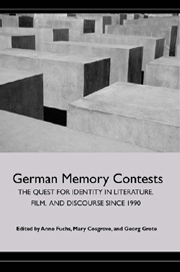Book contents
- Frontmatter
- Contents
- Acknowledgments
- Introduction: Germany's Memory Contests and the Management of the Past
- Positions
- Mediations
- Ethnicity/Hybridity
- 8 Imagined Identities: Children and Grandchildren of Holocaust Survivors in Literature
- 9 Of Stories and Histories: Golem Figures in Post-1989 German and Austrian Culture
- 10 Multi-Ethnicity and Cultural Identity: Afro-German Women Writers' Struggle for Identity in Postunification Germany
- Memory Politics
- Works Cited
- Notes on the Editors and Contributors
- Index
8 - Imagined Identities: Children and Grandchildren of Holocaust Survivors in Literature
from Ethnicity/Hybridity
Published online by Cambridge University Press: 05 February 2013
- Frontmatter
- Contents
- Acknowledgments
- Introduction: Germany's Memory Contests and the Management of the Past
- Positions
- Mediations
- Ethnicity/Hybridity
- 8 Imagined Identities: Children and Grandchildren of Holocaust Survivors in Literature
- 9 Of Stories and Histories: Golem Figures in Post-1989 German and Austrian Culture
- 10 Multi-Ethnicity and Cultural Identity: Afro-German Women Writers' Struggle for Identity in Postunification Germany
- Memory Politics
- Works Cited
- Notes on the Editors and Contributors
- Index
Summary
The representation of Jewish identity after the Shoah in German and Austrian texts is a complex and often problematic issue, showing up the highly contentious nature of German-Jewish memory contests. On the one hand post-Shoah Jewish identity continues to be negotiated within firmly established traditions; on the other hand any such negotiation involves an engagement with the Austrian and German cultural contexts. The destruction of the Jewish communities and cultural networks in Europe caused an unprecedented breakdown in continuity and a divide across which the search for an authentic Jewish tradition seems impossible. Jewish intellectuals and poets left behind a rich textual legacy in a variety of European languages. Innumerable literary and autobiographical works by authors such as Arthur Schnitzler, Else Lasker-Schüler, Gertrud Kolmar, Jakob Wassermann, and Joseph Roth convey an impression of Jewish life before the Shoah. These works explore the identity struggles of Jews between assimilation and self-assertion, between those who sought citizenship within Christian societies and those who wished to preserve their difference, opting instead to coexist alongside the dominant population, albeit within an ambiguously defined cultural context.
Throughout the following article the works of one of the most prominent post-Shoah writers, Ilse Aichinger, will be examined and revisited to assess different phases in the re-emergence of a literary Jewish culture after 1945. Aichinger's career began with the publication of her novel Die größere Hoffnung (1948, The Greater Hope, published in English as Herod's Children, 1963), a text whose radical position of alienation from the dominant culture has often been overlooked, and continues in the twenty-first century.
- Type
- Chapter
- Information
- German Memory ContestsThe Quest for Identity in Literature, Film, and Discourse since 1990, pp. 169 - 192Publisher: Boydell & BrewerPrint publication year: 2006



